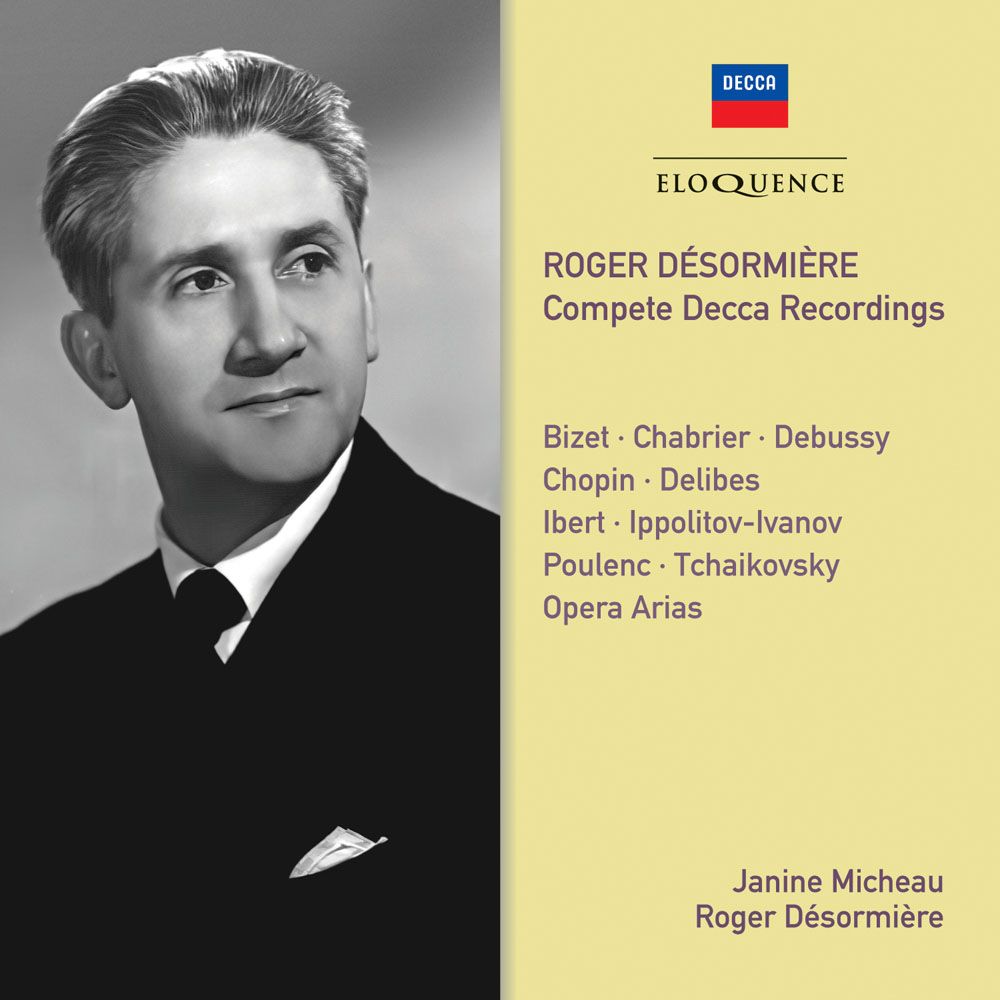A landmark tribute to Roger Désormière, a great French conductor of the mid-twentieth century, including many recordings new to CD.
A car crash in March 1953 cruelly cut short the career of Roger Désormière, who at the age of 53 had already established a reputation as one of the most insightful French conductors of his or any previous era. The resulting stroke left him barely able to communicate, incapable of work. His pupils, including Pierre Boulez, were distraught, but Désormière clung on for thirteen painful years, eventually dying a broken man.
Désormière’s legacy on disc is a case of what might have been. Record companies showed little interest in recording the modern repertoire of which he was so stylish and dedicated an interpreter, at least the equal in this regard of Hans Rosbaud and René Leibowitz. His one indisputable classic of the gramophone is the 1941 HMV recording of Pelléas et Melisande, but he recorded much else for several different labels.
The present set brings together all his Decca recordings for the first time, made in mono between 1947 and 1951, newly remastered and constituting a substantial tribute to a musician of manifold gifts. As a regular conductor of both the Ballets Suédois and the Ballets Russes in Paris, Désormière gave the premieres of Satie’s last two ballets; Decca captured his mastery of ballet conducting in suites of Scarlatti, Chopin, Delibes and Tchaikovsky. Of music from his own time there is Poulenc’s Les Biches, and the Divertissement of Ibert from 1951 (his final Decca recording), both done with the most refined ear for orchestral texture. His disc of lyric and coloratura arias with Janine Micheau unites him with a singer who, like him, brought a light touch to everything she did.
On a visit to London in May 1947 Désormière undertook his only recording assignment for Decca in the UK, recording in a single day Bizet’s Jeux d’enfants and Patrie Overture, Debussy’s Marche écossaise and Chabrier’s Habanera, in Kingsway Hall, with Sidney Beer’s body of freelance players, the National Symphony Orchestra. Every other recording was made with the Paris Conservatoire Orchestra, and each one has a character as Parisian as the Tuileries and the Bateaux-mouches.
ROGER DÉSORMIÈRE
Complete Decca Recordings
CD 1
1 BIZET Patrie – Overture*
2–6 BIZET Jeux d’enfants – Petite Suite*
7 CHABRIER Habanera*
8 DEBUSSY Marche ecossaise*
9–13 SCARLATTI–TOMMASINI The Good-Humoured Ladies*
CD 2
1–5 TCHAIKOVSKY The Sleeping Beauty – Suite, Op. 66a
6–9 IPPOLITOV-IVANOV Causasian Sketches – Suite No. 1*
10–15 IBERT Divertissement*
16–21 POULENC Les Biches – Suite
CD 3
1–7 CHOPIN–DOUGLAS Les Sylphides*
8–12 DELIBES Coppélia – Suite*
13–18 DELIBES Sylvia – Suite*
CD 4
1 GOUNOD Ah ! je veux vivre (Roméo et Juliette)
2 OFFENBACH Les oiseaux dans la charmille (Les Contes d’Hoffmann)
3 GOUNOD O légère hirondelle (Mireille)
4 THOMAS Je suis Titania (Mignon)
5 PROCH Deh! torna mi bene (Air and variations)
6 CHARPENTIER Depuis le jour (Louise)
Janine Micheau, soprano (CD 4)
National Symphony Orchestra (CD 1: 1–8)
Orchestre de la Société des Concerts du Conservatoire de Paris (CD1: 9–13; CDs 2–4)
Roger Désormière
*FIRST INTERNATIONAL CD RELEASE ON DECCA
Recording Producers: Terence Gibbs (Bizet: Jeux d’enfants); Victor Olof (Debussy, Chabrier, Bizet: Patrie, Gounod, Offenbach, Thomas, Proch, Charpentier); John Culshaw (Tchaikovsky, Ippolitov-Ivanov, Ibert, Poulenc, Scarlatti); unknown (Chopin, Delibes)
Balance Engineers: Kenneth Wilkinson (Bizet: Jeux d’enfants, Debussy, Chabrier, Bizet: Patrie, Tchaikovsky, Ippolitov-Ivanov, Ibert, Poulenc, Scarlatti, Gounod, Offenbach, Thomas, Proch, Charpentier); Unknown (Chopin, Delibes)
Recording Locations: Kingsway Hall, London, UK, 15 May 1947 (Bizet, Debussy, Chabrier); La Maison de la Mutualité, Paris, France, 24 May 1948 (Gounod, Proch); 25 May 1948 (Offenbach, Thomas, Charpentier); 21 February 1950 (Delibes); 22 February 1950 (Chopin); 15-20 June 1951 (Tchaikovsky, Ippolitov-Ivanov, Ibert, Poulenc, Scarlatti)
Transfers and Audio Restoration: Mark Obert-Thorn (CD 1)
Remastering Engineer: Chris Bernauer (CDs 2–4)
Original Decca Releases: (A)K 1845-46 (Bizet: Jeux d’enfants, Chabrier: July 1948); K 1990 (Charpentier, Offenbach: December 1948); K 2126 (Proch, Thomas: March 1949); K 2158 (Gounod: June 1948); LXT 2528 (Micheau recital: May 1951); K 2095 (Debussy: 1949); AK 2105-6 (Bizet: Patrie: November 1949); LM 4501 (Delibes: Coppélia: June 1950); LM 4502 (Delibes: Sylvia: June 1950); LM 4511 (Chopin: October 1950); LXT 2610 (Tchaikovsky, Ippolitov-Ivanov: September 1951); LXT 2720 (Poulenc, Scarlatti: September 1952); LXT 2868 (Ibert: January 1954)
‘A lovely voice and most accomplished coloratura … The orchestral playing and the recording are both good.’ Gramophone, April 1949 (Proch/Thomas)
‘played and recorded as well as they are ever likely to be’ High Fidelity, January 1953 (Poulenc, Scarlatti)
‘The whole thing sounds like a sketch from a sophisticated revue. Désormière points the jokes without overdoing them, and the recording is agreeable.’ The Record Guide, 1955 (Ibert)
‘The performance captures, with affectionate irony, the atmosphere of the period in which the music was conceived … and the recording is wonderfully realistic.’ The Record Guide, 1955 (Poulenc)
‘The orchestration is done with a very nice sense of style and the suite is sprucely played.’ The Record Guide, 1955 (Scarlatti)
‘Janine Micheau has been much admired … she always seems to enjoy exceptionally good recording.’ The Record Guide, 1955 (Micheau recital)
‘These charming and delicately scored ballets receive from Désormière and the Paris orchestra a charming and delicate performance.’ The Record Guide, 1955 (Delibes)
‘The conductor delivers fresh, lively readings … that hit precisely the right moods. His Divertissement is wonderfully sarcastic, with more guttersnipe attitude than in any other version I’ve heard. The Sleeping Beauty suite never loses its transparency, poise, or light-footed fleetness, nor The Good-Humored Ladies its wit and vigour.’ Fanfare, September 2004

